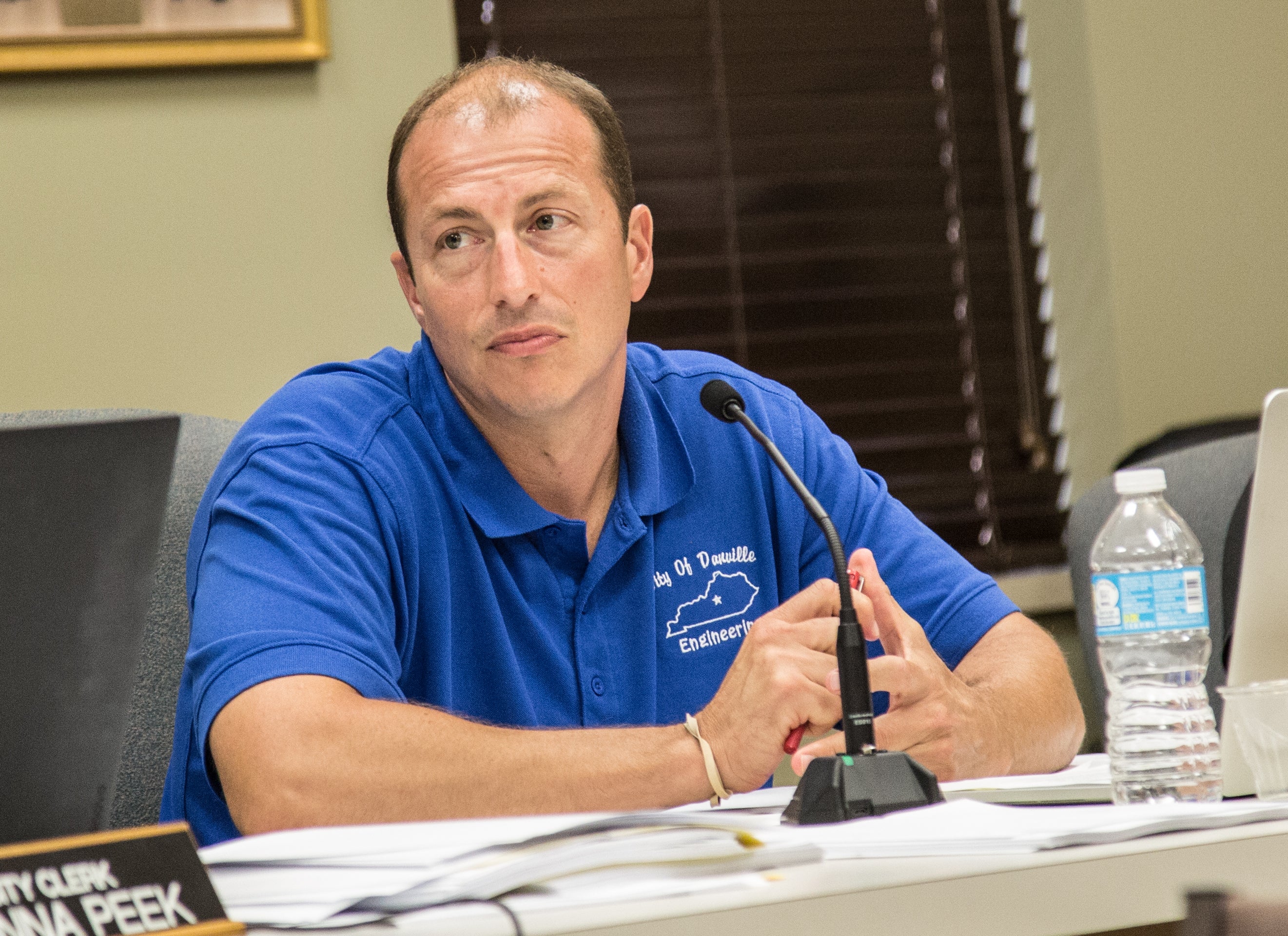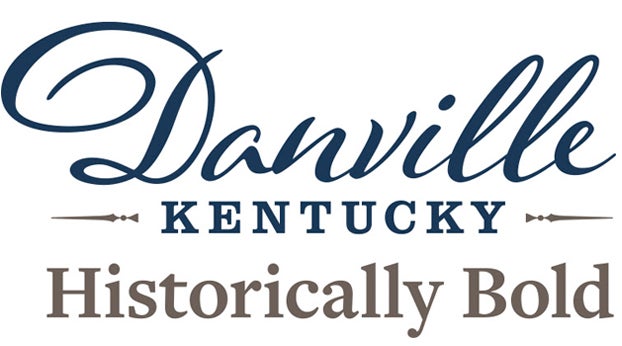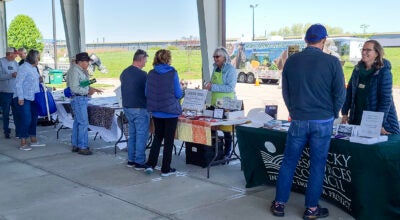Sewer rates on the rise
Published 8:07 am Wednesday, July 26, 2017

- Ben Kleppinger/ben.kleppinger@amnews.com Danville City Commissioner Earl Coffey talks to members of the city commission about sewer rates Monday.
Danville commissioners pass first reading of increases, say they had no alternative
With the EPA seemingly breathing down their necks, members of Danville City Commission reluctantly approved the first reading of large sewer rate increases Monday.
Commission members questioned the need for the increases for close to an hour but could find no alternative they were comfortable with.
Based on analysis of the ordinance by The Advocate-Messenger, the rates per 100 cubic feet of water would be increased by the following amounts:
• base residential and commercial sewer customers would pay $4.52 per 100 cubic feet instead of $2.644, an increase of about 70.9 percent;
• Perryville customers would pay $12.69 instead of $6.804, an increase of about 86.5 percent;
• Junction City customers would pay $9.40 instead of $5.92, an increase of about 58.8 percent; and
• industrial and wholesale customers would pay $4.20 instead of $3.123, an increase of 34.5 percent.
Increasing the sewer rates will allow the city to follow 10 recommendations from consultant Connie Allen with Salt River Engineering.
The recommendations are designed to finance future improvements and repairs; and improve the utility’s ability to monitor which customers are creating the most work for the water treatment plant, so that everyone can be billed for their fair share of the cost. They include re-evaluating who is on the utility’s industrial pre-treatment program; sampling wastewater up-stream from treatment; building a database on where phosphorous is coming from; and adding an “extra-strength wastewater” user class.
The commission ran into several obstacles repeatedly in their pursuit of an alternative to the increases. For one thing, the city’s wastewater treatment plant isn’t currently financial viable, consultant Connie Allen said. In the previous fiscal year, “the sewer utility took in approximately $2,993,900 in revenue and incurred $3,426,200 in expenses,” according to Allen’s cost of service study she completed for the city.
That’s a net loss of $432,300, which Chief Financial Officer Michele Gosser said was covered by excess water revenues. That’s not a sustainable practice and the city would get in trouble with its bond requirements if it keeps doing that long-term, officials told city commissioners.
Allen explained that the bonds the city took out to fund its water and sewer treatment facilities require that “water pays for water and sewer pays for sewer.”
“Your sewer utility will die if you don’t do something quickly,” she warned. “I don’t want to be overly dramatic, but I can’t spend more money than I make, so a utility can’t spend more money than it makes. It will quickly catch up with them.”
Without properly funding the sewer utility and meeting bond requirements, it would become possible for the city’s bond rating to drop, leading to higher interest payments on future bonds; or for the city’s current $10 million energy efficiency project to stall out, officials said.
Then there was the issue of the need to upgrade the wastewater treatment plant. City Engineer Earl Coffey said the treatment plant’s equipment is essentially two decades old — a lot of it came online around 1997 or 1998.
It’s going to take an estimated $4.5 million to complete a wastewater plant project, according to Allen’s study. But, Allen noted, besides losing close to half a million on the sewer utility last year, the city was unable to set aside any money toward that future cost.
The rates in the ordinance, which are based on recommendations from Allen, would fund “depreciation” costs, meaning the utility would have money in the bank for upgrades and improvements when they became necessary.
Perhaps the scariest of the obstacles commissioners ran into was the fact that the Environmental Protection Agency and the Kentucky Division of Water now have Danville in their crosshairs and may soon require the city to spend substantial sums of money to correct “sanitary sewer system overflows.”
Coffey told commissioners the EPA issued a violation on the city this spring and “that is in enforcement now.”
“Sometime this year, we expect them to dictate to us what the terms of that enforcement (will be),” he said. “We’ll have a penalty and I’m sure other actions — we’ll have to do some kind of corrective action plan, I’m sure.”
Other cities in Kentucky have had consent decrees issued on them requiring them to spend astronomical amounts on upgrading their sewer systems due to overflows — Louisville was ordered to spend $800 million and Winchester was ordered to spend $150 million, Coffey said.
“This (rate increase) is proactive so that when they show up, since our violation we can definitely say, ‘look, the city commission has already taken action,’” Coffey told commissioners. “So we hope they’d be more favorable in terms of what they’d make the city do. We definitely expect that.”
Overflows and the Clean Water Act
Coffey explained after the meeting that it’s essentially impossible to avoid all sewer overflows, which is what the Clean Water Act requires. That’s because heavy rains can flood a sewer system with up to five times as much rain water as there is sewage. In Danville, that means a heavy rain can put 16 million or even 20 million gallons of water into the system all at once, while the city only handles about 4 million gallons of sewage a day, he said.
All sewer systems have to operate as “open-air” systems, which means water can get in through points like manholes, or else they’ll “vacuum seal” and stop working, he explained.
“It’s just the nature of the laws of physics. You can’t overcome that,” Coffey said. “… The Clean Water Act doesn’t care about the laws of physics. The Clean Water Act says any water that’s discharged through a permit into the creek must be water — that’s it. It can’t be full of anything; it has to be water.
“… Practically speaking, the problem I have with that is that it’s stupid. Because a lot of the water you’re trying to handle is storm water.”
Coffey said Danville has overflows that happen during heavy rains, when the amount of rainwater overloads the system and untreated water flows back into the environment, but every sewer system has that same problem.
Danville has been more proactive than most in preventing what overflows it can with things like the addition of the Spears Creek Lagoon, which can capture up to 20 million gallons for five to 10 days, he said.
“We are very proactive. Communities that put in lagoons like that are normally forced to in their agreed order,” he said. “… We’ve tried to stem that off so our agreed order is more lenient when we eventually get it. We’l get one — it’s a matter of time.”
The EPA issued the city a violation this spring and the Kentucky Division of Water will be coming back to the city with an enforcement action, he said.
“They could come out of enforcement and say, ‘hey, you’ve got two years to eliminate these,’ or they could come out and say, ‘hey, here’s an agreed order,’ or they could come out and say, ‘hey, we’re referring your on up to the federal government,’ or they could say anything,” he said. “You don’t really get to negotiate because you have to eliminate them all, so what are you going to negotiate?”
Coffey said there’s also the possibility of fines for overflows, which he compared to speeding tickets.
“Lexington got assessed a $40,000 speeding ticket this year for their overflows,” he said. “I’m sure we’ll get one.”
Coffey said lots of city engineers have a problem with how the EPA is dealing so harshly with sewer utilities.
“The EPA has consistently said, ‘we’re not going to seek compliance by working with you; we’re going to seek compliance by issuing violations and issuing penalties and issuing enforcement. We’re no longer in the business of compliance assistance,’” he said. “And that was about 2012 and that was a Barack Obama EPA change, in my opinion, because it happened when he was there. That’s one of the policies that he changed that’s significant. Until somebody reverses that — which nobody is going to reverse it yet that I know of — that’s where we’re at; that’s what we’re dealing with.”
Passing first reading
Commissioner J.H. Atkins said the proposed sewer rate increases were hard to swallow.
“Do you have another suggestion?” Mayor Mike Perros asked.
“Yeah, I’m going home and eating some dinner, think about it. No I don’t have another suggestion,” Atkins said. “I didn’t take this job to raise taxes on my friends. But then I guess that’s all we’re talking about in 2017. I don’t have a suggestion, that’s just an editorial.”
Commissioner Kevin Caudill expressed frustration that “this all ties back to the unfunded mandate” of the Clean Water Act.
But commission members also expressed hope that tackling the increases now will mean better things for Danville in the future.
“We have to think 50 and sometimes even 100 years ahead and that’s a hard thing to wrap your brain around,” Commissioner Denise Terry said.
Perros said the current city commission “has had to shoulder some pretty heavy lifting over the past two years.”
“… At the end of the day, I hope we leave our tenure and this community in better shape than the day we accepted the office,” Perros said.
The first reading was motioned and seconded and a roll call vote was held. Atkins voted no. Terry and Perros voted yes. Caudill cast the deciding vote.
“I would like to vote no, but seems like that’s not an option, so yes.”






